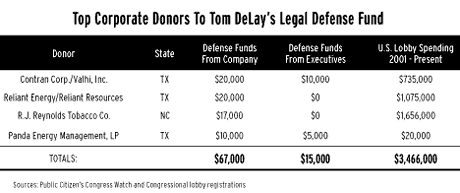DeLay’s Corporate Defenders

The legal defense fund of Congressman Tom DeLay—who is facing criminal indictment as a result of an addiction to corporate political contributions—is spending hundreds of thousands of dollars in additional corporate funds to help DeLay beat his criminal rap. Not surprisingly, many of the contributors to DeLay’s defense fund have business before Congress, where this congressman is still an invaluable ally.
Since 2000, when DeLay began fighting what became a slew of House ethics complaints, his legal defense fund has raised more than $1.4 million. This fund has bagged more than $900,000 since 2002, when DeLay’s Texans for a Republican Majority PAC (TRMPAC) spent $600,000 in corporate funds to help establish a GOP majority in the Texas House—despite Texas’ prohibition on corporate electioneering. A little-noticed irony of DeLay’s legal defense fund is that it is raising much of its money from the very type of political donors that precipitated DeLay’s indictment. More than 100 corporations have contributed in excess of $400,000 to DeLay’s defense fund, or 28 percent of all the money raised, according to data compiled by Public Citizen’s Congress Watch. The defense fund’s top four corporate donors—Contran, Reliant, RJ Reynolds, and Panda Energy—spent $3.5 million lobbying DeLay and other federal officials over the past five years.
“DeLay is so addicted to corporate money that he is now accepting it to fight charges that he laundered it,” said Conor Kenny, with the federal watchdog group Congress Watch. “The man lacks any sense of decency or, apparently, irony.”
RJ Reynolds (RJR) not only gave DeLay’s legal defense $17,000, the tobacco giant also provided the corporate jet that whisked DeLay to Houston last month for fingerprinting and to take the mug shot seen ’round the world. RJR previously provided job training for Jim Ellis, who would go on to direct DeLay’s national political action committee Americans for a Republican Majority. Ellis is now an indicted co-conspirator along with DeLay for his work with TRMPAC. But back in 1993, Ellis co-founded RJR’s front group, Ramhurst Corp. Through “smokers’ rights” and other campaigns this RJR-financed company opposed smoking restrictions, tobacco taxes, and FDA regulation of tobacco. In recent years RJR has spent $1.7 million on federal lobbyists, including the Alexander Strategy Group, run by former DeLay aides Ed Buckham, Tony Rudy, and Karl Gallant. When the Senate moved an FDA-regulation bill last year, Tom DeLay was there to send it up in smoke in the House.
Alexander Strategy also lobbies for Huntsman Chemical, which gave $5,000 in corporate funds to DeLay’s legal defense fund; Huntsman executives threw in $10,000 more of their own money. Huntsman is a major producer of MTBE. This chemical additive makes gasoline burn cleaner but also has polluted groundwater around the country. A massive congressional energy bill died in 2003 after the Senate rejected a House provision that would have shielded MTBE makers from toxic lawsuits. The House revived this provision this year but senators stripped it from the final energy bill that President Bush signed into law in August. Huntsman spent almost $1.5 million in recent years on federal lobbyists, including former Texas Lieutenant Governor Ben Barnes and lobbyists at the law firm of Bracewell Giuliani, which is part of DeLay’s legal defense team.

Dallas corporate raider Harold Simmons is a major source of support for DeLay’s legal defense fund. Simmons controls the holding companies Contran Corp. and Valhi, Inc., which gave $10,000 apiece toward DeLay’s defense. Simmons personally gave the legal fund another $10,000. A major GOP donor at the state and federal levels, Simmons controls a vast commercial empire that has spent $735,000 on federal lobbyists in the past five years.
Simmons is best known in Texas for his controlling interest in Waste Control Specialists (WCS), which spent a decade and up to $5 million lobbying the state to secure permits to open nuclear waste dumps in West Texas. WCS also has spent $175,000 lobbying the federal government in recent years. This year it snagged a contract to take 3,500 truckloads of radioactive waste from a federal bomb plant in Ohio.
Texas lobbyist Kent Hance recruited Simmons to invest in WCS. Hance represented the Louisiana Coushatta tribe while DeLay’s indicted lobbyist crony, Jack Abramoff, fraudulently billed the tribe some $32 million. This year Hance’s law firm Hance Scarborough Wright Ginsberg and Brusilow unsuccessfully defended TRMPAC Treasurer Bill Ceverha in a civil suit. A state judge ruled in May that Ceverha broke Texas law by failing to disclose TRMPAC’s corporate contributions to state officials.
Reliant Energy, a $20,000 corporate donor to DeLay’s defense fund, spent more than $1 million lobbying the federal government in the past five years. Reliant gave $25,000 in corporate funds to TRMPAC in 2002, the same year that it threw an Abramoff-attended baby shower for DeLay’s daughter, Danielle Ferro. (In 2002 Ferro worked as a TRMPAC consultant, banking $30,000 for her efforts.) One of Reliant’s top federal lobby firms is the Federalist Group, which employs former DeLay legislative director Drew Maloney. Maloney helped DeLay set up a 2002 golf tournament in which Reliant and other energy firms that contributed to DeLay PACs got to tee off with the then-House majority leader on the eve of a House-Senate conference on an omnibus energy bill. Last year the House ethics committee rebuked DeLay for this outing, which it said created the appearance of selling political access.
Dallas-based Panda Energy has given $10,000 to DeLay’s legal defense fund; CEO Bob Carter personally chipped in another $5,000. After building power plants in Nepal and China, Panda complained that these governments failed to honor power-purchasing contracts. Despite modest lobby expenditures, Panda found traction with its Nepali complaint in Congress. Nepal News reported this year that Republican members of Congress agreed to support duty-free imports of Nepali clothing—if the Nepal electric utility works out $3 million in debts to Panda.
It is still too early to say if the corporate money that got Tom DeLay into serious legal trouble can bail him out of it. What is clear is that—in the twisted world of politics—DeLay’s legal troubles present special interests with yet another way to curry favor with one of the most powerful members of Congress.
Andrew Wheat is research director for Austin-based Texans for Public Justice.


